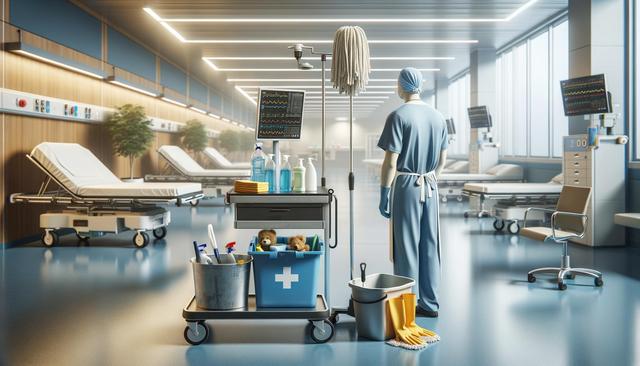The Role of Janitorial Staff in Healthcare Settings
Hospital janitorial cleaning jobs involve far more than just basic tidying. These roles are critical to maintaining the sanitation standards required in healthcare environments. Janitorial teams are responsible for cleaning patient rooms, operating theaters, waiting areas, restrooms, and hallways — all places that can harbor harmful pathogens if not properly sanitized. These professionals must follow strict cleaning protocols to ensure that bacteria, viruses, and other contaminants are effectively eliminated. In addition to surface disinfection, janitorial staff often handle the proper disposal of medical waste, which is essential to preventing cross-contamination and ensuring compliance with health regulations.
Due to the sensitive nature of hospitals, janitorial staff must be trained in infection prevention practices, the use of hospital-grade disinfectants, and the proper handling of biohazard materials. Their work supports the broader infection control strategies of the hospital and plays a direct role in reducing hospital-acquired infections (HAIs). Without their efforts, even the most advanced medical treatments and procedures could be compromised by unsanitary conditions.
Training and Standards for Hospital Janitors
Unlike general cleaning roles, hospital janitorial cleaning jobs require specialized training and adherence to high standards. New hires often undergo onboarding programs that cover:
- Proper use of personal protective equipment (PPE)
- Safe handling of hazardous materials
- Disinfection techniques for high-touch surfaces
- Protocols for isolation rooms and infectious disease control
Additionally, many hospitals follow guidelines from public health agencies to standardize cleaning procedures. These standards are designed to minimize risks and ensure consistency across all areas of the facility. Training also includes updates on new cleaning technologies and products, which are continuously evolving to improve efficiency and effectiveness. For example, electrostatic sprayers and UV disinfection tools are increasingly being integrated into hospital cleaning routines.
Ongoing education is crucial as new pathogens emerge and healthcare environments evolve. Janitors must stay informed about current protocols and regulatory changes, ensuring their work remains compliant and effective in protecting vulnerable patients and healthcare workers.
Preventing Hospital-Acquired Infections
One of the most compelling reasons for investing in quality hospital janitorial cleaning is the direct impact it has on patient safety. Hospital-acquired infections are a significant concern, and effective cleaning can reduce their occurrence by up to 30%. These infections can lead to prolonged hospital stays, increased healthcare costs, and in severe cases, fatal outcomes. By maintaining a consistently clean and sanitized environment, janitorial staff help limit the spread of harmful microorganisms.
Key areas of focus in infection prevention include:
- Disinfecting high-touch surfaces such as bed rails, light switches, and doorknobs
- Regular cleaning of shared medical equipment
- Thorough sanitation of restrooms and common areas
- Proper waste management and disposal practices
These tasks may seem routine, but they are essential in breaking the chain of infection. In multi-bed units or high-traffic areas like emergency rooms, prompt and thorough cleaning between patients is vital. Without diligent janitorial work, even routine medical procedures can carry undue risk.
Challenges Faced by Hospital Janitors
Despite their critical role, hospital janitors often face unique challenges. The physical demands of the job are considerable, involving long hours on foot, moving heavy equipment, and dealing with exposure to chemicals and biohazards. Emotional challenges also arise, particularly when working in high-stress environments such as intensive care units or emergency departments.
Workload variability is another challenge. During outbreaks or flu seasons, cleaning demands can increase significantly. Janitors must often work extra shifts or respond to urgent cleaning requests, which can lead to fatigue and burnout if not managed properly. Furthermore, the need to work discreetly around patients and clinical staff adds another layer of complexity to their role.
Support from hospital administration makes a significant difference. Providing adequate staffing, investing in ergonomic tools, and recognizing the contributions of janitorial staff are ways hospitals can help mitigate these challenges. When janitors are treated as integral members of the healthcare team, their performance and job satisfaction both improve.
Career Opportunities and Job Outlook
For those considering a career in hospital janitorial cleaning, the outlook is generally positive. As healthcare facilities continue to prioritize infection control, the demand for trained cleaning staff remains steady. Entry-level positions typically require a high school diploma or equivalent, though some facilities may offer on-the-job training. Opportunities for advancement exist, particularly for those who take additional certifications or move into supervisory roles.
Hospital janitorial jobs can lead to careers in environmental services management, where professionals oversee cleaning operations, staff scheduling, and compliance with health regulations. These roles offer greater responsibility and higher earning potential, making them an attractive option for those who wish to grow within the healthcare industry.
In many regions, healthcare facilities offer competitive pay, benefits, and job stability. The work may be physically demanding, but it provides a meaningful way to contribute to public health. As awareness grows about the importance of cleanliness in medical settings, the value of hospital janitorial professionals is gaining broader recognition.
Conclusion: Recognizing the Value of Hospital Janitorial Jobs
Hospital janitorial cleaning jobs play a vital role in the overall healthcare ecosystem. These professionals work behind the scenes to uphold hygiene standards, reduce infection risks, and create safer environments for both patients and staff. Despite the challenges, their contributions are indispensable and deserve recognition. For individuals seeking meaningful work with a direct impact on public health, hospital janitorial roles offer a stable and valuable career path. As healthcare needs evolve, the importance of skilled and dedicated janitorial staff will only continue to grow.







